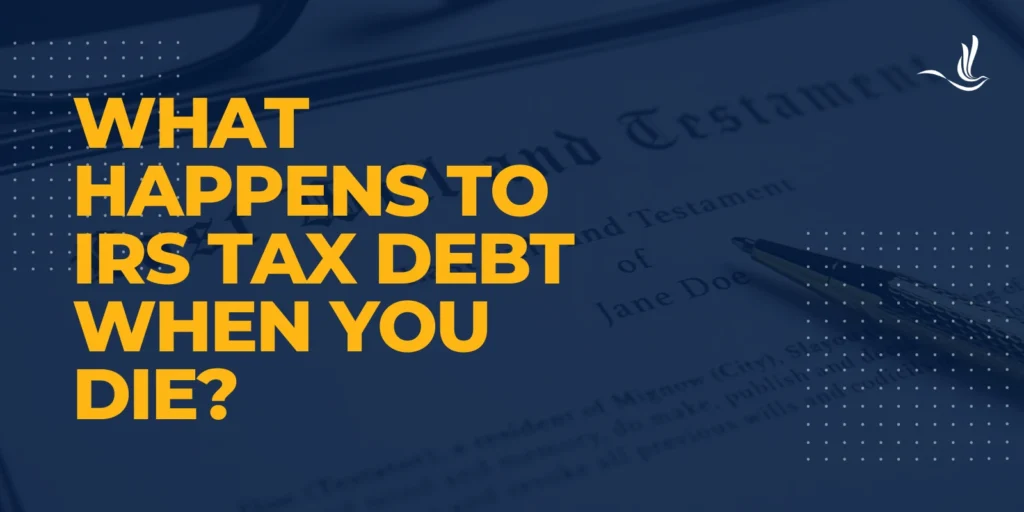
Death is an inevitable part of life, but what happens to our financial obligations when we pass away? Among the many considerations that arise after someone dies, tax liabilities can be a complex issue that requires careful attention and understanding. While tax liabilities don’t simply vanish upon death, the way they’re handled can vary depending on several factors. These include the type of liability, the estate’s assets, and applicable laws. Let’s delve into what happens to tax debt after death and explore the implications for their estate and heirs.
Types of Tax Liability
Tax liabilities typically falls into two categories: federal and state. Federal tax obligations are owed to the IRS, while state taxes are owed to the relevant state tax authority. These can arise from various sources, such as income taxes, property taxes, or estate taxes.
Responsibilities of the Estate
Tax liabilities are generally considered a personal liability. This means that it’s tied to the individual who incurred the balance rather than their heirs or beneficiaries. So, when you die, your tax balance doesn’t automatically transfer to your family members. When someone dies, their estate becomes responsible for settling any outstanding balances, including tax obligations. An estate encompasses all the assets, property, and liabilities left behind by the deceased individual. Executors or administrators, appointed to manage the estate, play a crucial role in this process.
Surviving Spouses
In community property states, where spouses share ownership of assets and liabilities incurred during the marriage, the surviving spouse may be held responsible for the deceased spouse’s back taxes. However, even in community property states, the IRS typically only pursues the surviving spouse for tax liabilities if they were also responsible for filing the tax return or if the tax owed is related to joint returns.
Settling Tax Liabilities
The settlement of tax liabilities from an estate typically follows a specific procedure:
- Notification of Death: Executors or family members should inform relevant tax authorities of the individual’s death.
- Filing Final Tax Returns: The executor must file the deceased person’s final income tax returns. These returns cover the period up to the date of death. They are also typically due by the usual April 15 tax filing deadline.
- Payment of Tax Liability: Any taxes owed up to the date of death must be paid from the estate’s assets. This includes income taxes for the final year and any unpaid taxes from previous years.
- Estate Tax Returns: If the estate’s value exceeds certain thresholds, an estate tax return may be required at the federal and/or state level. Estate taxes are assessed on the transfer of wealth from the deceased individual to their heirs and beneficiaries.
- Payment of Estate Taxes: If estate taxes are owed, they must be paid from the estate’s assets before distribution to heirs.
Assets and Liabilities
The assets and liabilities of the estate play a significant role in determining how tax liabilities are settled. If the estate’s assets are insufficient to cover the tax obligations, certain assets may need to be sold to satisfy the balance. However, some assets, such as retirement accounts with named beneficiaries, may pass directly to heirs outside of the probate process and therefore not be subject to estate taxes.
Inheritance and Heirs
Heirs and beneficiaries of an estate are generally not personally responsible for the deceased individual’s tax balance. However, the amount they inherit may be affected if tax obligations deplete the estate’s assets. Sometimes, heirs may receive less than anticipated if a significant portion of the estate is used to settle tax liabilities.
Options for Resolving Tax Liabilities
If an estate lacks sufficient assets to cover tax liability, there are several options available:
- Negotiation with Tax Authorities: Executors may negotiate with tax authorities to establish a payment plan or settle the balance for less than the full amount owed.
- Sale of Assets: Selling assets from the estate can generate funds to pay off tax balance.
- Abatement or Discharge: In certain circumstances, tax liabilities may be discharged or reduced, such as when it is disputed or when the estate qualifies for relief programs.
- Seeking Professional Guidance: Executors and heirs should consider consulting with tax professionals or estate attorneys to navigate the complexities of settling tax liabilities. Doing so can help ensure compliance with applicable laws.
Estate Planning Strategies
To minimize taxes on your estate and loved ones, it’s essential to engage in proactive estate planning. This may involve creating a will, establishing trusts, making gifts to beneficiaries during your lifetime, and exploring tax-saving strategies. By taking these steps, you can potentially reduce the amount of taxes owed by your estate and ensure a smoother transfer of assets to your heirs.
Tax Help for Taxpayers Who Owe
Navigating tax liability after the death of a loved one requires careful attention to detail and an understanding of the legal and financial implications involved. Executors play a crucial role in ensuring that tax obligations are properly addressed and settled from the deceased individual’s estate. By following the appropriate procedures and seeking professional guidance when necessary, families can manage tax liability effectively and minimize the impact on heirs and beneficiaries. Optima Tax Relief is the nation’s leading tax resolution firm with over $1 billion in resolved tax liabilities.
If You Need Tax Help, Contact Us Today for a Free Consultation